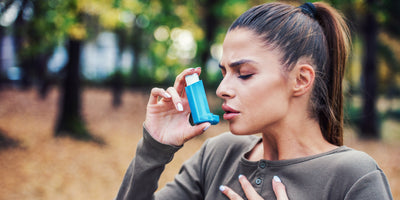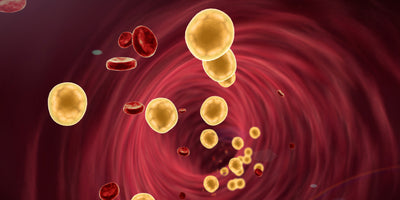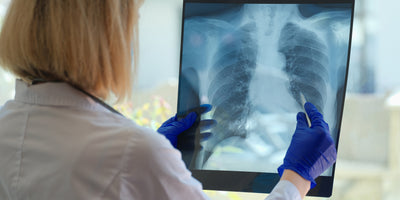
Hydrate Supplements and Hydration for Managing Menopause Symptoms: Alleviating Hot Flashes and Night Sweats
Introduction
Menopause marks a significant transition in a woman's life, characterised by the cessation of menstrual periods and a decline in reproductive hormones. This period, typically occurring in the late 40s to early 50s, brings with it a host of symptoms that can affect a woman's daily life and overall well-being. Among the most common and discomforting symptoms are hot flashes and night sweats, which can disrupt sleep, exacerbate stress, and affect quality of life. While hormone replacement therapy (HRT) and lifestyle adjustments are commonly discussed remedies, the role of hydration—particularly through the use of hydrate supplements—has emerged as a pivotal yet underappreciated strategy in managing these symptoms. In this article, we delve into the physiological underpinnings of menopause, explore the connection between hydration and symptom relief, and examine how hydrate supplements, alongside natural hydration boosters, can offer solace and support during this transitional phase.
Menopause is not just a hormonal adjustment but a whole-body experience that demands a holistic approach to symptom management. Dehydration can exacerbate many menopausal symptoms, making it imperative to maintain optimal hydration levels. However, the nuances of achieving and sustaining this state of hydration are often overlooked. Beyond simply drinking water, the strategic use of hydrate supplements can provide targeted support, helping to alleviate the intensity of hot flashes and reduce the frequency of night sweats. This article aims to unpack the complexities of hydration in the context of menopause, offering insights into how women can navigate this phase with informed choices about their hydration practices.
Understanding Hydration and Menopause: An Overview
The transition into menopause brings a plethora of physiological changes, with declining estrogen levels being the most prominent. This hormonal shift has far-reaching effects, including alterations in the body's ability to retain moisture, thus increasing the likelihood of dehydration. Dehydration, in turn, can trigger or worsen menopausal symptoms such as hot flashes, night sweats, and vaginal dryness. Understanding this interplay is crucial for managing symptoms effectively. Hydration aids in regulating body temperature, ensuring that the body's cooling mechanisms function efficiently. Therefore, adequate fluid intake becomes not just a matter of general health but a targeted strategy to mitigate some of the most challenging aspects of menopause.
Furthermore, as estrogen levels decrease, the risk of cardiovascular disease and osteoporosis rises, underscoring the importance of hydration in maintaining overall health. Water supports cardiovascular function and helps in the transport of nutrients essential for bone health, making hydration a multifaceted tool in managing menopause. Recognising these connections, it becomes clear that addressing hydration is not merely about quenching thirst but about supporting the body's adjusted needs during menopause, providing a foundation for both symptom relief and long-term health.
The Role of Hydrate Supplements in Menopause Management
Hydrate supplements, designed to enhance the body's hydration status, come in various forms, including electrolyte powders, tablets, and infused waters. These supplements offer a practical solution for increasing fluid intake and ensuring that the body receives a balanced mix of essential minerals lost through sweat, such as sodium, potassium, and magnesium. For menopausal women, these supplements can be particularly beneficial in managing hot flashes and night sweats. By replenishing electrolytes and promoting better hydration, these supplements help stabilise the body's thermal regulation system, potentially reducing the severity and frequency of these symptoms.
Moreover, hydrate supplements often contain added vitamins and minerals that support overall health, addressing menopause-related concerns such as bone density and cardiovascular health. Choosing the right supplement involves considering factors like sugar content, added ingredients, and individual health needs, emphasising the importance of informed selection. As part of a comprehensive approach to menopause management, incorporating hydrate supplements into daily routines can offer a simple yet effective way to improve quality of life during this transition. However, it's essential to consult with a healthcare provider to ensure these supplements align with individual health profiles and complement other management strategies.
Natural Hydration Boosters for Menopause Symptom Relief
Hydration during menopause can extend beyond water and hydrate supplements to include a variety of foods and drinks that naturally boost the body’s hydration levels. Fruits and vegetables with high water content, such as cucumbers, celery, watermelon, and strawberries, not only contribute to hydration but also provide essential vitamins and minerals that support overall health during menopause. Additionally, herbal teas, particularly those with sage and black cohosh, have been traditionally used to alleviate menopausal symptoms, including hot flashes and night sweats, offering a comforting and hydrating remedy.
Incorporating these natural hydration boosters into one's diet can also help manage other menopause-related symptoms, such as mood swings and weight gain. For instance, the fiber in fruit and vegetables can aid in digestion and promote satiety, which is beneficial for weight management. Moreover, staying adequately hydrated can improve skin elasticity, which tends to decrease with age and hormonal changes during menopause. By making mindful dietary choices, women can enhance their hydration status, support their body through the menopausal transition, and enjoy a range of health benefits that go beyond simply managing hot flashes and night sweats.
The Science Behind Hot Flashes and Hydration

Hot flashes, characterised by sudden feelings of warmth that spread over the body and can lead to sweating, flushing, and chills, are among the most common symptoms of menopause. They result from the body's thermoregulatory center in the brain becoming more sensitive to slight changes in body temperature. As estrogen levels fluctuate, this sensitivity can cause the body to overreact to temperature changes, leading to the uncomfortable sensations associated with hot flashes. Hydration plays a critical role in the body's temperature regulation, and inadequate fluid intake can make the body more prone to these sudden temperature spikes.
Research suggests that maintaining a balanced hydration level can help moderate the body's response to temperature changes, potentially reducing the frequency and intensity of hot flashes. Water aids in dissipating heat through sweating and respiration, mechanisms that are vital for cooling the body during a hot flash. Furthermore, staying well-hydrated helps improve blood circulation, which can also contribute to better temperature regulation. Thus, understanding the link between hydration and the body's thermal control offers a scientific basis for using hydration as a strategy to manage hot flashes during menopause.
Hydration Strategies for Reducing Night Sweats
Night sweats, or excessive sweating during sleep, are closely related to hot flashes and can significantly disrupt sleep quality. Adopting hydration strategies can be particularly effective in managing this symptom, starting with ensuring adequate fluid intake throughout the day. Avoiding diuretics such as caffeine and alcohol, especially in the hours leading up to bedtime, can also help maintain hydration levels overnight. Drinking a glass of water before bed is commonly advised, but it's important to balance fluid intake to avoid frequent nighttime awakenings for bathroom visits.
Creating a bedtime routine that includes hydrating skin care products can also aid in maintaining skin moisture and comfort throughout the night. Additionally, optimising the bedroom environment to enhance sleep hygiene—using breathable bedding, maintaining a cool room temperature, and possibly using a humidifier—can support better hydration and reduce the occurrence of night sweats. Personalised hydration strategies, considering individual lifestyle, health status, and specific menopause symptoms, can provide a tailored approach to improving sleep quality and reducing the discomfort of night sweats.
Electrolytes and Menopause: Balancing Body Fluids for Optimal Health
Electrolytes, including sodium, potassium, magnesium, and calcium, play a crucial role in maintaining the body’s hydration, nerve function, and muscle function. During menopause, hormonal changes can disrupt the balance of these vital minerals, affecting overall hydration and exacerbating symptoms such as hot flashes and night sweats. Integrating electrolyte-rich foods into the diet or using electrolyte supplements can help restore this balance, promoting better hydration and symptom management. Foods such as bananas, avocados, leafy greens, nuts, and seeds are excellent sources of electrolytes and can easily be incorporated into daily meals.
Moreover, as the body ages and goes through menopause, the risk for osteoporosis increases, making calcium an essential electrolyte to focus on. Magnesium plays a supportive role in calcium absorption and bone health, further highlighting the importance of maintaining a balanced intake of these minerals. Drinking electrolyte-infused waters or taking specific supplements can also aid in achieving the right electrolyte balance, but it's important to do so under the guidance of a healthcare professional to avoid overconsumption, which can lead to other health issues. Proper electrolyte management not only supports hydration and reduces menopausal symptoms but also contributes to long-term health benefits, including bone health and cardiovascular function.
Debunking Myths: Hydration and Menopause Symptom Management
Myths and misconceptions about menopause and hydration abound, often leading to confusion and ineffective symptom management strategies. One common myth is that drinking more water alone is enough to manage all menopause symptoms. While hydration is crucial, it's part of a broader strategy that includes diet, exercise, stress management, and sometimes medical interventions. Another myth is the belief that all hydrate supplements are the same and universally beneficial. In reality, supplements vary in composition and effectiveness, and what works for one person may not work for another, underscoring the importance of personalised advice from healthcare professionals.
Additionally, there’s a misconception that only large amounts of water can prevent dehydration. In fact, staying hydrated also involves consuming fluids and foods with high water content throughout the day, not just large quantities of water at once. This approach to hydration is more effective and sustainable, especially for managing menopause symptoms. Dispelling these myths is crucial in empowering women to make informed decisions about their hydration practices and overall health during menopause.
Personalised Hydration Plans for Menopausal Women
Creating a personalised hydration plan can significantly improve the management of menopausal symptoms. Such a plan takes into account an individual’s lifestyle, health status, symptom severity, and personal preferences. Consulting with healthcare professionals can provide valuable insights into the specific hydration needs and how to meet them effectively, whether through dietary adjustments, hydrate supplements, or a combination of strategies.
Personalised plans often include monitoring hydration status through simple indicators such as urine color and frequency, adjusting fluid intake based on activity level and climate, and incorporating electrolyte balance into dietary considerations. Recognising that each woman’s experience of menopause is unique, personalised hydration strategies offer a tailored approach to symptom management, emphasising the importance of listening to one’s body and making adjustments as needed. This individualised approach not only addresses the immediate discomforts associated with menopause but also supports overall health and well-being during this transition.
Innovative Hydrate Supplements and Technologies for Menopause
The landscape of hydrate supplements and technologies for managing menopause symptoms is evolving, with innovations designed to offer more effective and convenient solutions. From time-release hydrate capsules that maintain hydration levels throughout the day to smart water bottles that track intake and remind users to drink, technology is playing a significant role in hydration management. Additionally, new supplement formulations with added vitamins, minerals, and natural extracts target specific symptoms of menopause, such as hot flashes and night sweats, offering holistic support beyond hydration.
Emerging research into the synergistic effects of certain minerals and plant-based compounds on menopause symptoms is leading to the development of targeted hydrate supplements. These advancements not only promise enhanced efficacy but also greater personalisation of symptom management strategies. As these technologies and supplements become more accessible, they offer hope for improved quality of life for menopausal women, emphasising the critical role of innovation in health and wellness.
Summary
Menopause and Hydration: An Overview
- Menopause marks a significant hormonal shift that can lead to various symptoms, including hot flashes and night sweats.
- Proper hydration is crucial during menopause, as it helps mitigate symptoms and supports overall health.
- Hydrate supplements offer a targeted approach to improving hydration and can be beneficial for managing menopause symptoms.
- Different types of supplements cater to individual needs and preferences, emphasising the importance of informed selection.
- Foods and drinks with high water content, as well as herbal teas, naturally enhance hydration and offer symptom relief.
- A balanced diet rich in electrolytes and water-rich foods supports hydration and overall well-being during menopause.
- Hot flashes are influenced by the body’s thermoregulatory changes during menopause.
- Adequate hydration can help regulate body temperature and reduce the frequency and intensity of hot flashes.
- Maintaining optimal hydration levels, especially before bedtime, can minimise night sweats.
- Adjusting bedroom environment and nighttime routines supports better sleep and reduces sweating.
- Electrolytes are essential for hydration, nerve and muscle function, and can be disrupted during menopause.
- Incorporating electrolyte-rich foods and supplements into the diet helps maintain balance and supports symptom management.
- Hydration involves more than just drinking water; it’s about balanced intake of fluids and electrolytes.
- Not all hydrate supplements are alike; personal needs and health considerations should guide choices.
- Tailoring hydration strategies to individual lifestyles and health statuses ensures effective symptom management.
- Consulting healthcare professionals is key to developing a comprehensive and personalised hydration plan.
- New supplement formulations and technologies offer enhanced support for managing menopause symptoms.
- Smart devices and targeted supplements provide innovative ways to maintain hydration and health.







